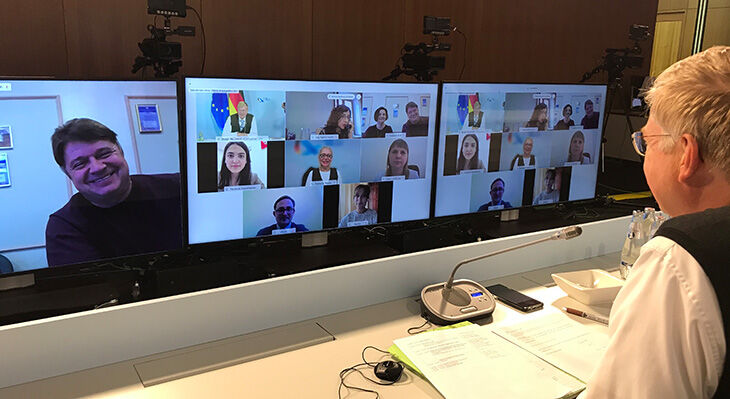The German-Russian bilateral working group – a success story despite the coronavirus pandemic
The list of jointly developed products and instruments in German-Russian vocational education and training cooperation is becoming longer each year, the range of topics is becoming broader and bilateral exchange is thus becoming increasingly important. The 14th annual meeting of the German-Russian working group was thus held despite COVID-19 – online.

The German-Russian bilateral working group meets each year to actively discuss topical issues and requirements in vocational education and training. Communication between the ministries at subdivision level has proven to be essential here, with benefits for the further development of new ideas and projects. And as all representatives greatly value this important discourse, the meeting still took place again this year, with the digital format having no adverse effects on the constructive dialogue.
The joint successes achieved through the cooperation over the last year
- A real novelty was seen in the form of the first manual of a bilateral working group in international vocational education and training in the Federal Ministry of Education and Research (BMBF). With the participation of all actors in German-Russian cooperation, two parts have been published: a well-founded historical perspective of the common roots of vocational education and training in the two countries and a second, practice-oriented volume with handling recommendations from cooperation experience.
- The Russian versions of the metal technology and process technology implementation guides in BIBB’s “Ausbildung Gestalten” (shaping training) series were compared with Russian professions and adapted accordingly together with the Russian Federal Institute of Educational Development (FIRO). These publications are helping to make training in Russia even more practice-oriented.
- Another product provides an excellent illustration of how enriching the practical exchange in education and training is, namely the film on German-Russian demonstration examinations in the field of mechatronics, which underscores the added value provided by joint training and examination standards.
- At the level of an expert dialogue, exchange is taking place up to the end of the year in the areas of agriculture and agricultural machine technology, organised by DEULA Nienburg.
- New topic areas in German-Russian cooperation since 2019 comprise inclusion in vocational education and training, vocational orientation for young people, and training in research facilities and waste management. Study tours with experts from both countries have already taken place here, for example.
German-Russian cooperation in vocational education and training

The dialogue with the Russian Federation in the area of vocational education and training since 2013 has been dynamic and constructive on both sides. Pressing issues and problems in Russia remain the lack of experts and a lack of mechanisms to improve quality in the area of initial vocational education and training. Also against this backdrop, the Russian Government is striving to introduce practice-oriented and dual elements of vocational education and training, and to enhance its existing system to meet the needs of the labour market.
The principle of dual education and training based on the German model and quality assurance for training based on “independent examinations” is now being implemented in Russia’s 85 regions. Corresponding laws relating to this have already been revised and standards for professional pedagogical staff have been implemented. Another important step has been making it possible to write off operating expenses for training from personnel costs against tax. The aim here is to encourage more companies to invest in vocational education and training and thus increase the proportion of practical training.
Who is currently active in the bilateral working group
The working group is chaired by BMBF Head of Directorate Fritjov Männel and his colleague Tatevik Karabekyan from the Russian Federation’s Ministry of Education. Further members on the Russian side include the Agency for Strategic Initiatives (ASI), the Federal Institute of Educational Development (FIRO), the National Qualifications Development Agency (NARK), the youth agency, the institute for vocational education and training for major research facilities in Dubna and the federal agricultural association. Alongside BMBF, the following institutions are represented on the German side: GOVET, the DLR Project Management Agency, iMOVE, the German-Russian youth exchange, Forschungszentrum Jülich (a research centre) and the German-Russian Chamber of Commerce Abroad in Moscow.
The German-Russian cooperation in vocational education and training is based on a “Joint Declaration of Intent” (previously Memorandum of Understanding) from the year 2012 at ministerial level. The Federal Institute for Vocational Education and Training (BIBB) has been cooperating with the Federal Institute of Educational Development (FIRO) for eight years. GOVET accompanies this cooperation.